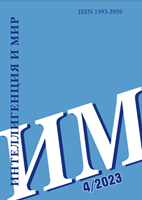Малые Дела Российских И Украинских Землячеств В Париже
Small Deeds Of The Russian And Ukrainian Communities Of Paris
Author(s): Sergey V. KosterinSubject(s): Cultural history, Political history, Social history, Social Theory, Sociology of Culture, Pre-WW I & WW I (1900 -1919), Interwar Period (1920 - 1939), Migration Studies, Sociology of Politics
Published by: Ивановский государственный университет
Keywords: famine; food crisis; Russian Diaspora; community; intelligentsia; charity; Bolsheviks; grain export; American Relief Administration;
Summary/Abstract: Emigrant assistance to the impoverished Soviet intelligentsia in the first half of the 1920s remains one of the confusing and little-studied episodes. Historians have only casually mentioned the existence of fraternities in Paris. The purpose of the article is to fill in the existing gaps in particular, revealing the genesis of targeted care for Soviet intellectuals, the mechanisms and motives of patronage, the composition of those under guardianship, their attitude to help and the circumstances of its fading. The periodical press has become the “historical ore” as well as archival documents introduced into scientific circulation for the first time. The deplorable material and moral state of the intelligentsia, its value to society and the Bolshevik repressions against its most talented part became an incentive for emigrants to choose this category of Soviet society as an object of charity. The Russian Public Committee in France to help the famine-stricken in Russia established special organizations — fraternal communities — to attract funding from Russian emigre circles and intensify humanitarian work. Soon, many of them acquired legal independence. Entertainment events and donations have become the main sources of funds for apolitical organizations. Foreign money was also attracted. The impoverishment of emigration interfered with the work of the organizations. The patronage was implemented mainly by sending American Relief Administration parcels, and from money transfers. Beginning in 1925, the community started to evolve in the direction of supporting compatriots within France and gradually turned into clubs. Emigrant help was often the only means for Soviet intellectuals to survive. It found positive feedback from the wards, although it was not systemic and large enough. Supporting the impoverished intellectuals, the fraternities protected Russian culture.
Journal: Интеллигенция и мир
- Issue Year: 2023
- Issue No: 4
- Page Range: 9-33
- Page Count: 25
- Language: Russian

